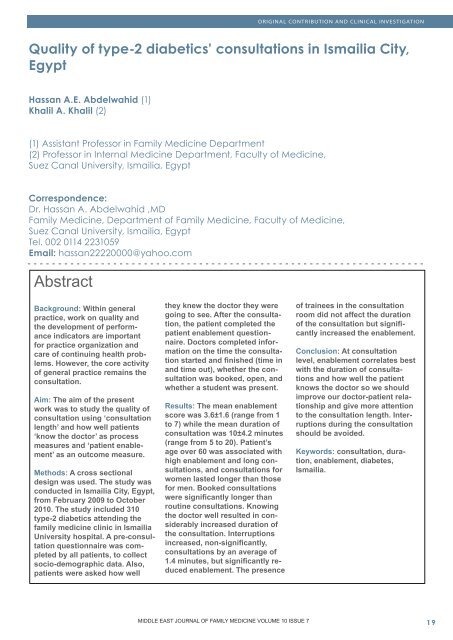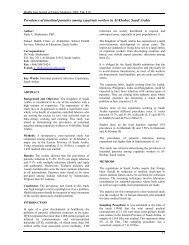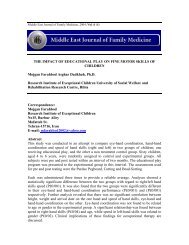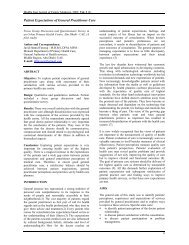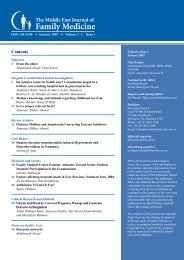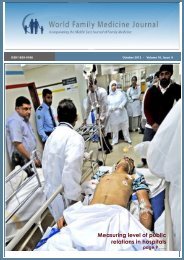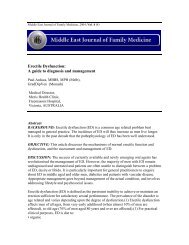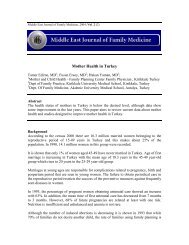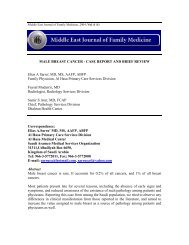ORIGINAL CONTRIBUTION AND CLINICAL INVESTIGATION24. Kivanc, M. and Kunduhoglu, B.(1997). Antimicrobial Activity <strong>of</strong> FreshPlant Juice on the Growth <strong>of</strong> Bacteriaand Yeasts. <strong>Journal</strong> <strong>of</strong> QafqazUniversity, 1: 26-53.25. Alhaj, N. A.; Shamsudin,M.N.; Zamri, H. F. and Abdullah,R. (2008). Extraction <strong>of</strong> EssentialOil from Nigella sativa UsingSupercritical Carbon Dioxide: Study<strong>of</strong> Antibacterial Activity. American<strong>Journal</strong> <strong>of</strong> Pharmacology andToxicology, 3(4): 225-228.26. Hammer, K. A.; Carson, C. F,and Riley, T. V. (1999). AntimicrobialActivity <strong>of</strong> Essential Oils and OtherPlant Extracts. <strong>Journal</strong> <strong>of</strong> AppliedMicrobiology, 86: 985-990.27. Elgayyar, M.; Draughon, F.A.; Golden, D. A. and Mount, J.R. (2001). Antimicrobial Activity <strong>of</strong>Essential Oils from Plants againstSelected Pathogenic and SaprophyticMicroorganisms. <strong>Journal</strong> <strong>of</strong> FoodProtection, 64 (7): 1019-1024.28. Bakhiet, A. O.; Mohammed,S.D.; El Badwi, S. M.A.; AbdelGadir, W. S.; Alkhatim, A. H. andAdam, S. E. I. (2006). AntimicrobialActivity <strong>of</strong> Petroselinum sativum andCoriandrum sativum Seeds. <strong>Journal</strong><strong>of</strong> Microbiology, 1 (4): 346-352.29. Dubey, A.; Mishra, N. and Singh,N. (2010). Antimicrobial Activity<strong>of</strong> Some Selected Vegetables.International <strong>Journal</strong> <strong>of</strong> AppliedBiology and PharmaceuticalTechnology, I: 994-999.30. Silva, NCC and FernandesJúnior, A. (2010) Biological Properties<strong>of</strong> Medicinal Plants: A Review <strong>of</strong>Their Antimicrobial Activity. <strong>Journal</strong><strong>of</strong> Venomous Animals and ToxinsIncluding Tropical Diseases, 16: 402-413.31. Chao, S.; Young, G.; Oberg, C.and Nakaoka, K. (2008). Inhibition <strong>of</strong>Methicillin-Resistant Staphylococcusaureus (MRSA) by Essential Oils.<strong>Journal</strong> <strong>of</strong> Flavour and Fragrance,23: 444-449.Answers and feedback to CME Quiz1.Metacid is an organophosphorous compound with anticholinesteraseaction.True2. Anti-cholinesterase pesticides are an uncommon cause <strong>of</strong> acutepoisoning.False3. Organophosphorous compounds readily penetrate the skin.True4. Clinical features vary depending on the relative effects onparasympathetic nerves, sympathetic ganglia and neuro-muscularjunctions.True5. Initial effects are due to parasympathetic activity.True6. Weakness <strong>of</strong> skeletal muscle is due to enzyme suppression atneuro-muscular junctions.True7. Atropine blocks parasympathetic overactivity.TrueFeedbackAnti-cholinesterase pesticides (organophoshates) are a most commoncause <strong>of</strong> acute poisoning in farmers.Organophosphates bind to acetyl-cholinesterase enzyme, inhibiting it andcausing symptoms <strong>of</strong> excessive cholinergic (parasympathetic) activity.The key signs <strong>of</strong> cholinergic overload are: frothy oral secretions, vomiting,abdominal pain, diarrhoea, constricted pupils, altered consciousness,bradycardia (or tachycardia) and muscle fasciculations.Organophosphates also suppress enzymes at nicotinic receptors, thusinhibiting neuromuscular transmission at nicotinic synapses – the majorcause <strong>of</strong> respiratory muscle paralysis.Initial management should focus on managing and stabilizing airway,breathing and circulation (ABC).There is a risk <strong>of</strong> contamination <strong>of</strong> health personnel, as well as ongoingabsorption for the patient. Ramesh’s clothing should be removed andwashed thoroughly, and his skin washed with soap and water. Healthworkers must wear rubber gloves whilst doing this to protect themselvesfrom contamination.There is no role here for GI decontamination as the pesticide was notingested by mouth, but absorbed through the skin.While the above measures are being taken, definitive treatment should bestarted without delay.18 MIDDLE EAST JOURNAL OF FAMILY MEDICINE VOLUME 10 ISSUE 7MIDDLE EAST JOURNAL OF FAMILY MEDICINE • VOLUME 7, ISSUE 10
ORIGINAL CONTRIBUTION AND CLINICAL INVESTIGATIONQuality <strong>of</strong> type-2 diabetics’ consultations in Ismailia City,EgyptHassan A.E. Abdelwahid (1)Khalil A. Khalil (2)(1) Assistant Pr<strong>of</strong>essor in <strong>Family</strong> <strong>Medicine</strong> Department(2) Pr<strong>of</strong>essor in Internal <strong>Medicine</strong> Department, Faculty <strong>of</strong> <strong>Medicine</strong>,Suez Canal University, Ismailia, EgyptCorrespondence:Dr. Hassan A. Abdelwahid ,MD<strong>Family</strong> <strong>Medicine</strong>, Department <strong>of</strong> <strong>Family</strong> <strong>Medicine</strong>, Faculty <strong>of</strong> <strong>Medicine</strong>,Suez Canal University, Ismailia, EgyptTel. 002 0114 2231059Email: hassan22220000@yahoo.comAbstractBackground: Within generalpractice, work on quality andthe development <strong>of</strong> performanceindicators are importantfor practice organization andcare <strong>of</strong> continuing health problems.However, the core activity<strong>of</strong> general practice remains theconsultation.Aim: The aim <strong>of</strong> the presentwork was to study the quality <strong>of</strong>consultation using ‘consultationlength’ and how well patients‘know the doctor’ as processmeasures and ‘patient enablement’as an outcome measure.Methods: A cross sectionaldesign was used. The study wasconducted in Ismailia City, Egypt,from February 2009 to October2010. The study included 310type-2 diabetics attending thefamily medicine clinic in IsmailiaUniversity hospital. A pre-consultationquestionnaire was completedby all patients, to collectsocio-demographic data. Also,patients were asked how wellthey knew the doctor they weregoing to see. After the consultation,the patient completed thepatient enablement questionnaire.Doctors completed informationon the time the consultationstarted and finished (time inand time out), whether the consultationwas booked, open, andwhether a student was present.Results: The mean enablementscore was 3.6±1.6 (range from 1to 7) while the mean duration <strong>of</strong>consultation was 10±4.2 minutes(range from 5 to 20). Patient’sage over 60 was associated withhigh enablement and long consultations,and consultations forwomen lasted longer than thosefor men. Booked consultationswere significantly longer thanroutine consultations. Knowingthe doctor well resulted in considerablyincreased duration <strong>of</strong>the consultation. Interruptionsincreased, non-significantly,consultations by an average <strong>of</strong>1.4 minutes, but significantly reducedenablement. The presence<strong>of</strong> trainees in the consultationroom did not affect the duration<strong>of</strong> the consultation but significantlyincreased the enablement.Conclusion: At consultationlevel, enablement correlates bestwith the duration <strong>of</strong> consultationsand how well the patientknows the doctor so we shouldimprove our doctor-patient relationshipand give more attentionto the consultation length. Interruptionsduring the consultationshould be avoided.Keywords: consultation, duration,enablement, diabetes,Ismailia.MIDDLE MIDDLE EAST EAST JOURNAL JOURNAL OF OF FAMILY MEDICINE VOLUME • VOLUME 10 ISSUE 7, ISSUE 7 10 19


